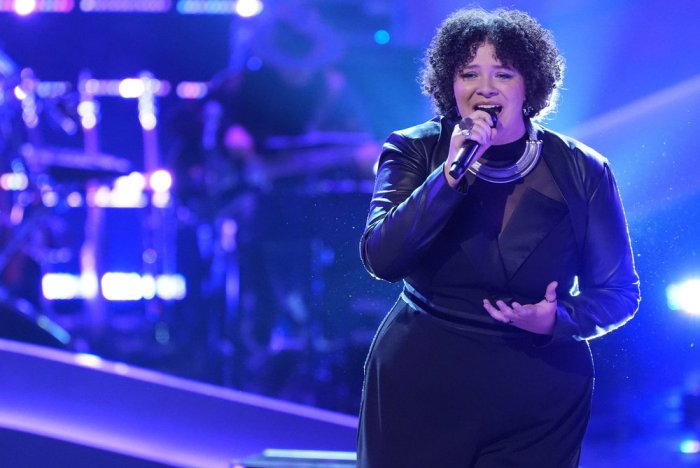Guitar legend emerges from pandemic with new album
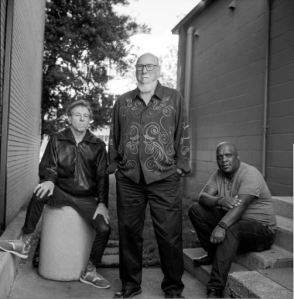
(Photo by Michael Wilson)
The social distancing and other aftereffects of COVID-19 may have caused plenty of creative outlets to grind to a halt, but it didn’t stop storied guitarist Steve Cropper from putting the finishing touches on Fire It Up, his latest solo effort. While the Rock & Roll Hall of Famer’s résumé includes a founding role in Booker T. & the MG’s, membership in the Blues Brothers (that continues to this day) and stints backing up the likes of Eric Clapton, Neil Young and playing in the house band for Bob Dylan’s 30th anniversary event at Madison Square Garden, the self-described old road dog was feeling restless during the lockdown when friend and frequent musical collaborator Jon Tiven reached out with a proposal.
Tiven produced Nudge It Up a Notch, a 2008 collaboration between Cropper and storied Rascals keyboardist Felix Cavaliere. These sessions yielded a trove of unused recorded tracks that Tiven urged the guitarist to check out. Cropper was pleasantly surprised with what he heard.
“[Back then], Felix decided he wasn’t going to finish up these songs, so I had written them off,” Cropper said. “Tiven called me with the idea of putting this out. I told him to let me hear it and we decided to get [vocalist] Roger [Reale] to play on [Fire It Up]. I had been told several times to get myself a singer. Maybe he’s the one.”
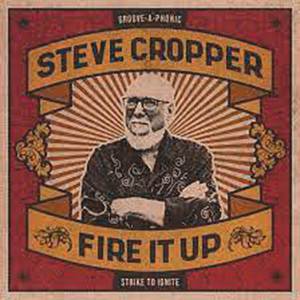 Tiven and Cropper both call Nashville home and are only a 10-minute drive from each other. The past two decades have seen the two writing songs together on a weekly basis whenever the latter was home from touring. A good chunk of the resurrected instrumental material was already recorded and includes playing by Rascals founding member Cavaliere and a murderer’s row of drummers that included Anton Fig (David Letterman), Simon Kirke (Bad Company), Omar Hakim (Sting) and Chester Thompson (Phil Collins). Tracks were fleshed out with contributions from Tiven (bass, saxophone, background vocals, harmonica) and drummer Nioshi Jackson. Tiven’s next-door neighbor Beth Hooker also swung by to add harmony vocals. With Reale living North and unable to come to Tennessee, his vocals were recorded in a pandemic-friendly way.
Tiven and Cropper both call Nashville home and are only a 10-minute drive from each other. The past two decades have seen the two writing songs together on a weekly basis whenever the latter was home from touring. A good chunk of the resurrected instrumental material was already recorded and includes playing by Rascals founding member Cavaliere and a murderer’s row of drummers that included Anton Fig (David Letterman), Simon Kirke (Bad Company), Omar Hakim (Sting) and Chester Thompson (Phil Collins). Tracks were fleshed out with contributions from Tiven (bass, saxophone, background vocals, harmonica) and drummer Nioshi Jackson. Tiven’s next-door neighbor Beth Hooker also swung by to add harmony vocals. With Reale living North and unable to come to Tennessee, his vocals were recorded in a pandemic-friendly way.
“The vocals were sung through an iPhone, which is very strange,” Cropper said. “Every track was done and even our engineer Eddie Gore said he couldn’t believe [how well it came out having been] done through [that kind of device]. And after he put the vocals on, it was easy for me to listen to what he sang and play to it.”
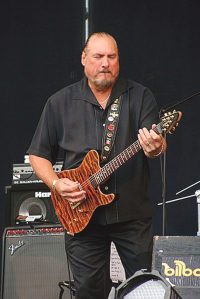
(Photo by Alberto Cabello/ CC BY 2.0)
The resulting 13 cuts on the album feature a solid mix of soul highlighted by Cropper’s trademark fat guitar tone. Highlights ranged from “One Good Turn,” a horn-kissed ballad with a hint of subtle piano runs and a rare Cropper solo and the funky shuffle “The Go-Getter is Gone” to “She’s So Fine,” a song with a co-write by Bad Company’s Paul Rodgers highlighted by Cropper’s cascading chord progressions. Known for the instrumentals he recorded with Booker T. & the MG’s, Cropper goes back to the well with “Bush Hog,” a number named for an industrial-size lawn mower that rides on a wavy groove and is peppered with meaty guitar licks.
What marks the material is its understatement, a hallmark of both Cropper’s playing and personality. Born on a farm in Willow Springs, Missouri, the musical lightbulb didn’t go off over the young Cropper’s head until his family moved to Memphis when he was nine. It was then that he was exposed to a wealth of sounds he’d never heard before.
“During my early days moving to Memphis was the first time I’d ever heard R&B or gospel music,” he said. “It was really good-feeling music and I loved it because I was brought up on a mish-mash of different material. I was basically brought up on a farm, so I didn’t hear radio unless it was in the car. When we finally had a radio, it was automatically locked on one station—WDIF and they had a gospel program on that I thought was great music. I didn’t know there was such a thing.”
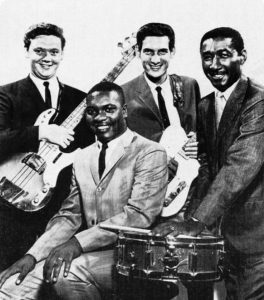
(Public domain)
Meeting up with late friend and future MG Donald “Duck” Dunn in high school, the duo started playing around the age of 14, with Dunn gravitating to bass given his difficulty learning how to play guitar.
“We met on a softball field in junior high,” Cropper recalls. “The thing about Duck and me was that we had buddies at school that played guitar and hung out a little. [My high school buddy] Charlie Freeman and I put a band together. Duck wanted to play guitar too, but he wasn’t all that good at it. He comes walking in one day with a four-string bass. Later, he said he grew up playing a four-string ukulele. I don’t know if that had anything to do with it, but he just could not grasp the electric guitar like everybody else could. He turned out to be the world’s greatest bass player and played on a lot of hits.”
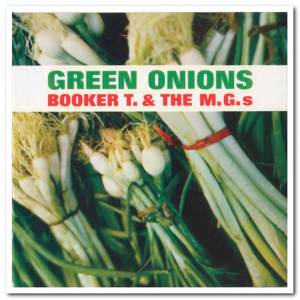 The duo eventually joined forces with keyboardist Booker T. Jones and drummer Al Jackson Jr. to become Booker T. and the MG’s, the house band for Memphis-based Stax Records and one of the first racially integrated rock bands. In addition to churning out their own hits (“Green Onions,” “Hang ‘Em High,” “Time is Tight”), the quartet backed up numerous artists including Otis Redding, Wilson Pickett, Sam & Dave, The Staple Singers, Albert King and Johnnie Taylor. And while the foursome dissolved and regrouped during the ‘70s (Jackson was murdered in 1975), Cropper and Dunn found themselves recruited into a new project by comedians John Belushi and Dan Aykroyd. Cropper and Dunn’s membership in the Blues Brothers dates back to Levon Helm’s RCO All-Stars, a band Belushi became enamored with after catching them play a New Year’s Eve gig at Manhattan’s Palladium in the late ‘70s.
The duo eventually joined forces with keyboardist Booker T. Jones and drummer Al Jackson Jr. to become Booker T. and the MG’s, the house band for Memphis-based Stax Records and one of the first racially integrated rock bands. In addition to churning out their own hits (“Green Onions,” “Hang ‘Em High,” “Time is Tight”), the quartet backed up numerous artists including Otis Redding, Wilson Pickett, Sam & Dave, The Staple Singers, Albert King and Johnnie Taylor. And while the foursome dissolved and regrouped during the ‘70s (Jackson was murdered in 1975), Cropper and Dunn found themselves recruited into a new project by comedians John Belushi and Dan Aykroyd. Cropper and Dunn’s membership in the Blues Brothers dates back to Levon Helm’s RCO All-Stars, a band Belushi became enamored with after catching them play a New Year’s Eve gig at Manhattan’s Palladium in the late ‘70s.
“[John] made a comment, which we heard about later, where he said if he ever put a band together, he wanted it to be [Levon’s] band,” Cropper said. “It turned out that Steve Martin was playing a bunch of shows out in California at the Universal Amphitheatre and he told John he wanted Danny and him to open for him. John told him that they didn’t do stand-up comedy and Steve said he didn’t care what they did. [The promoters] wanted [Steve] to do these shows and rather than use a local act, he wanted to use John and Danny. So Belushi asked if Steve minded if they played music and Steve said if that’s what they wanted to do, it was fine with him. So [John] started putting a band together and asked trombone player Tom ‘Bones’ Malone if [John and Danny] should [recruit] the whole Saturday Night Live band. Malone said you better get Dunn and Cropper because they’re old road dogs, since we’d already done two world tours already.”
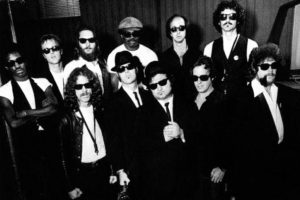
(Photo courtesy of Atlantic Records)
Cropper appeared in both Blues Brothers films, the 1980 original and the 1998 sequel, and played with the band in the years since Belushi’s sudden 1981 death. Over the past three-plus decades, Cropper hasn’t slowed down, playing with artists ranging from Ringo Starr and Roy Orbison to Paul Simon and Frank Black. And while Dunn passed away in 2012, Cropper has periodically reunited with Jones, most recently at An Evening of Respect for Otis Redding, an annual charity event last held at the Apollo Theater in 2018. Cropper still gets a kick out of hearing the iconic hits he played on all these years later.
“When I hear ‘Green Onions,’ I still can’t believe I was part of that,” he said. “Soul Man” is a particular favorite. “You can hear the first two notes of the intro and you know what’s coming next,” he said. “I didn’t invent it, but I played it.”






